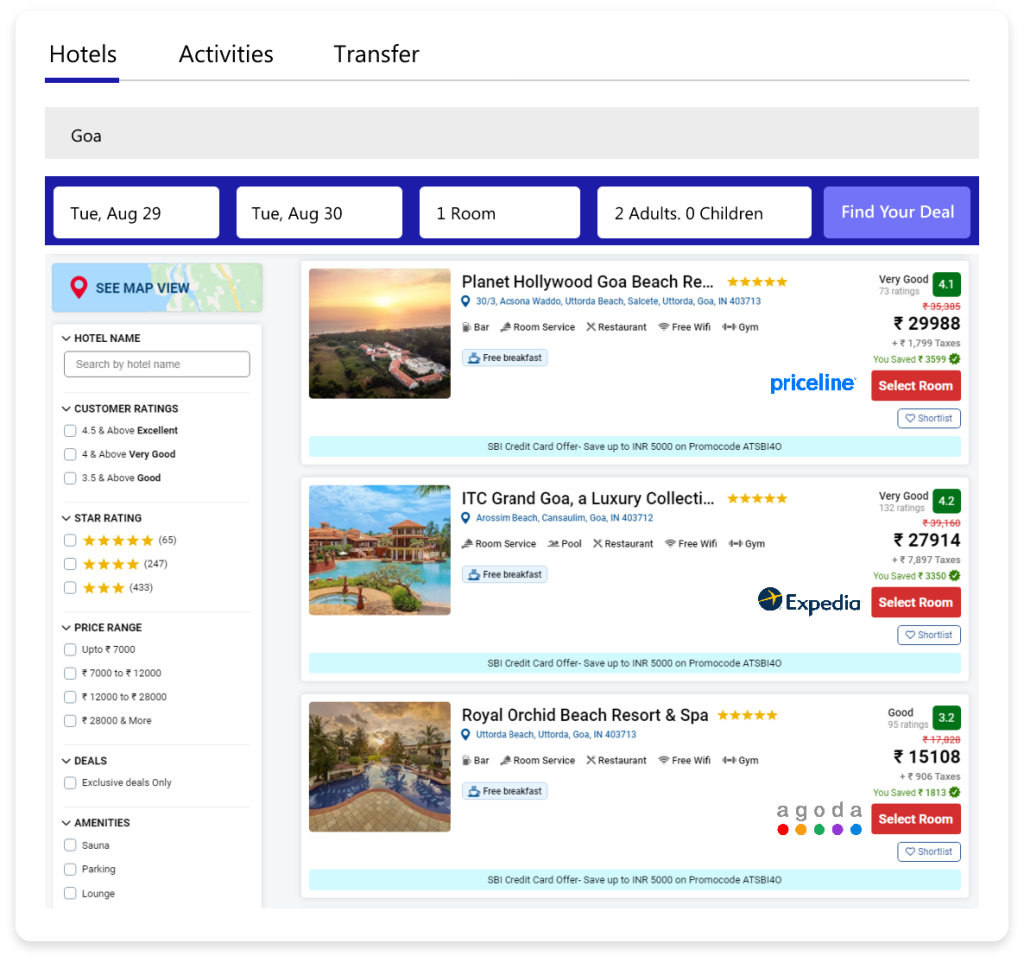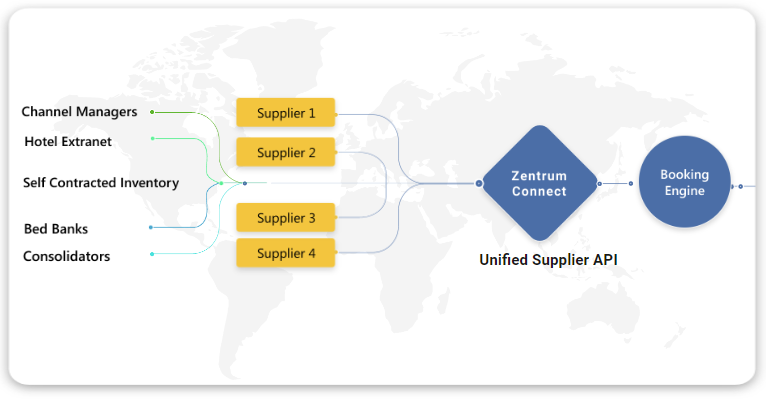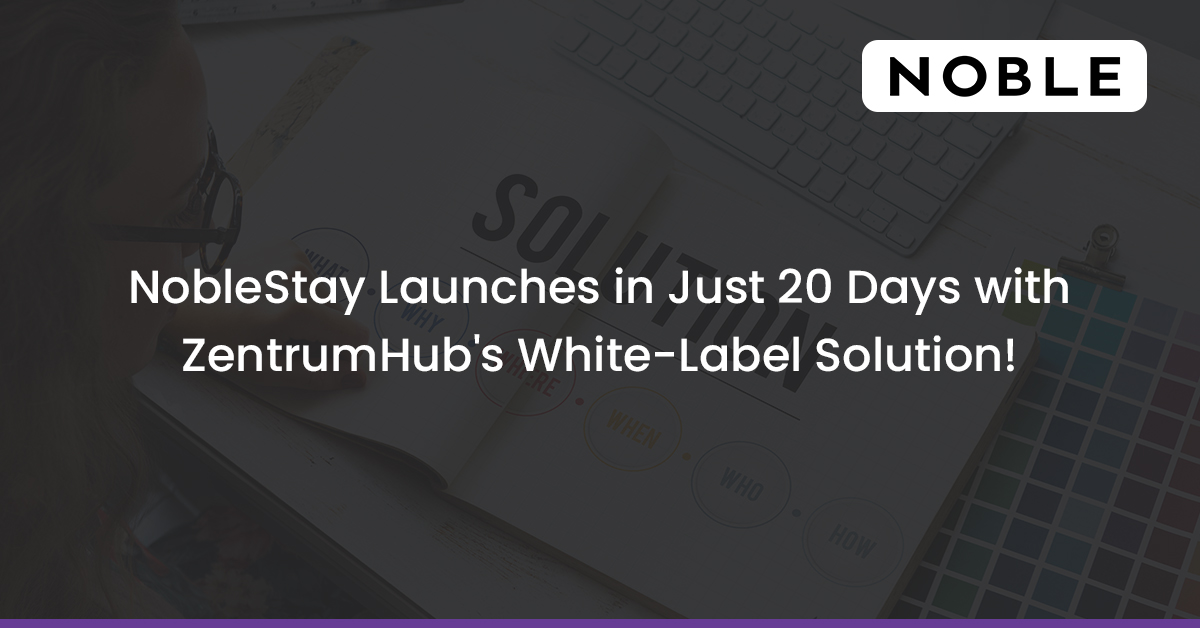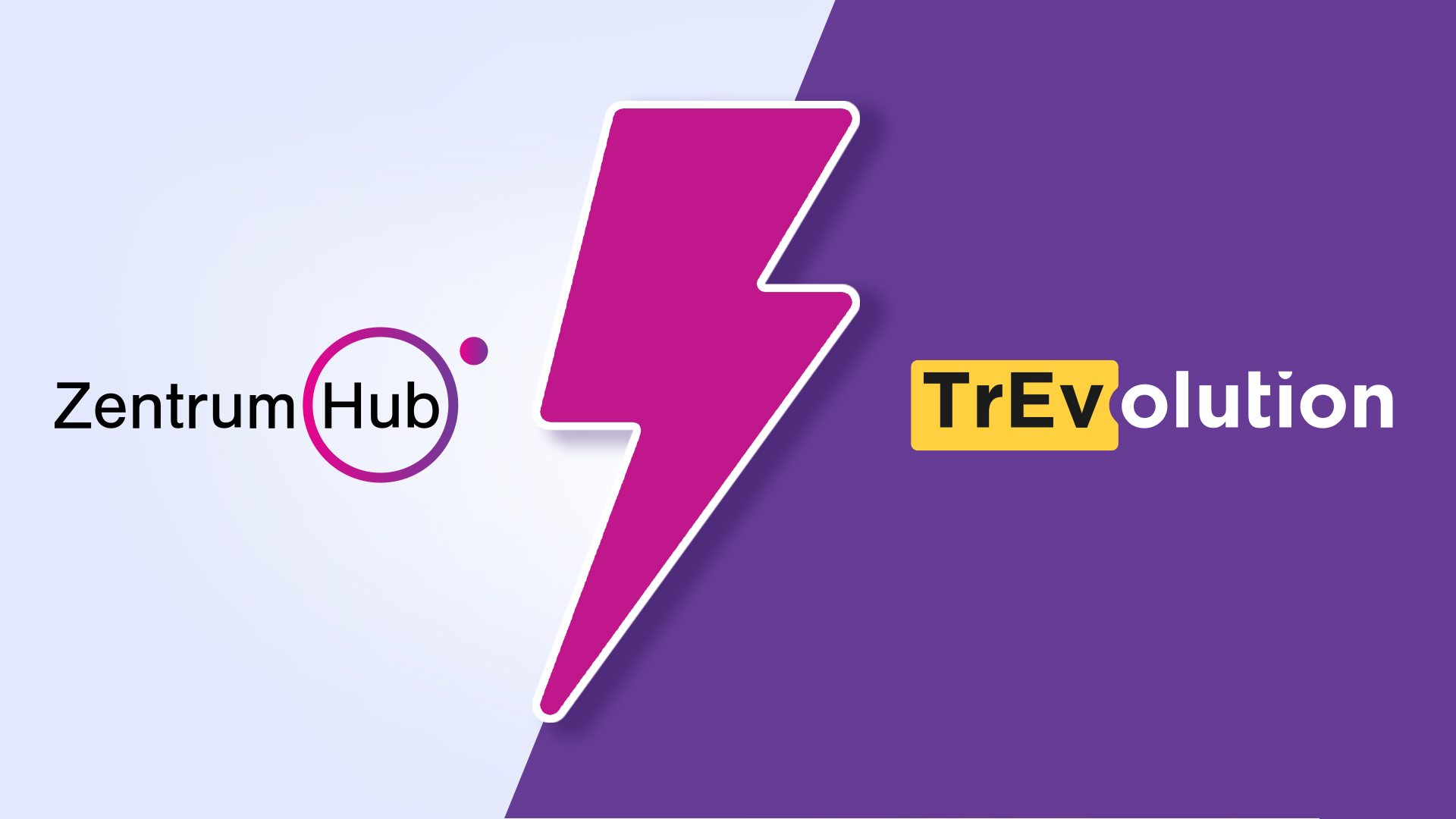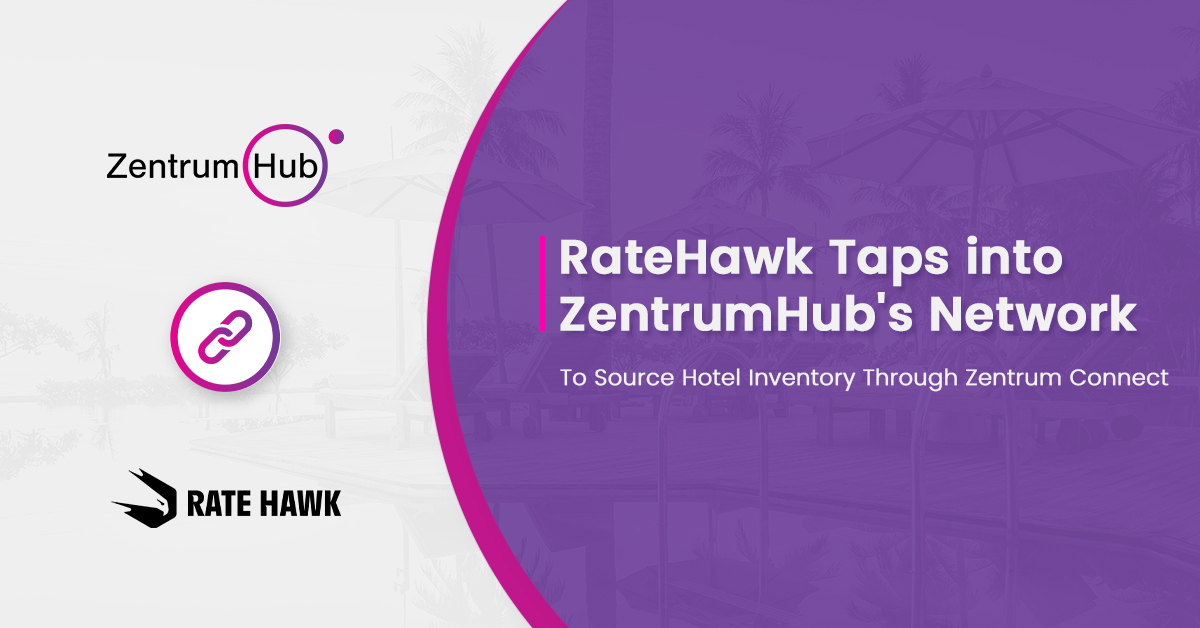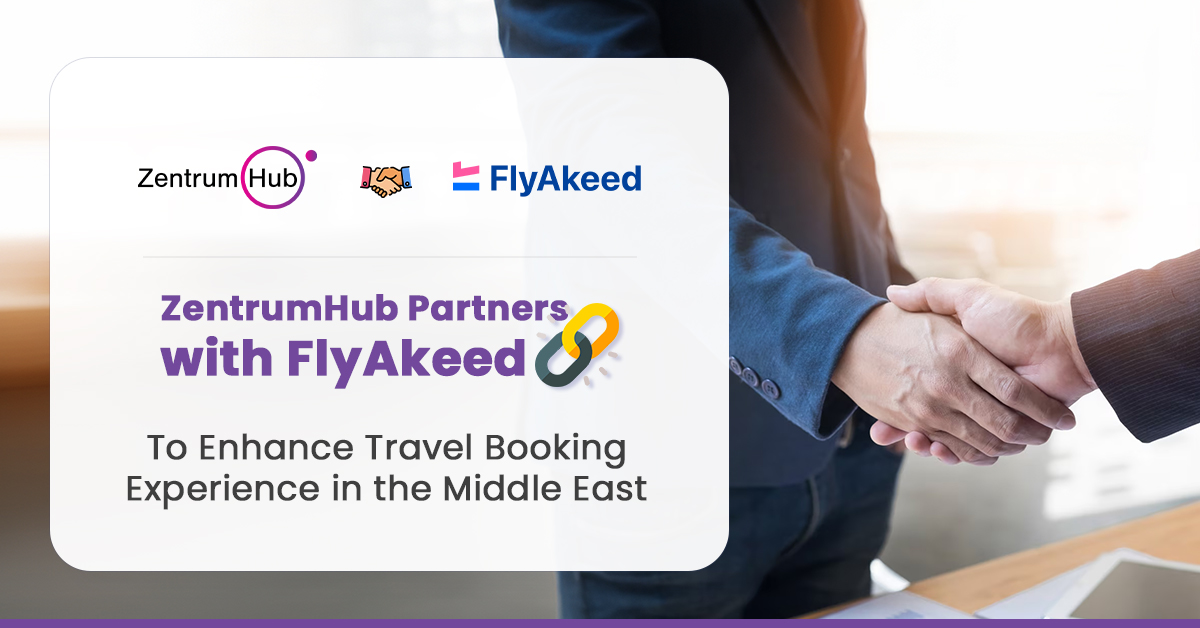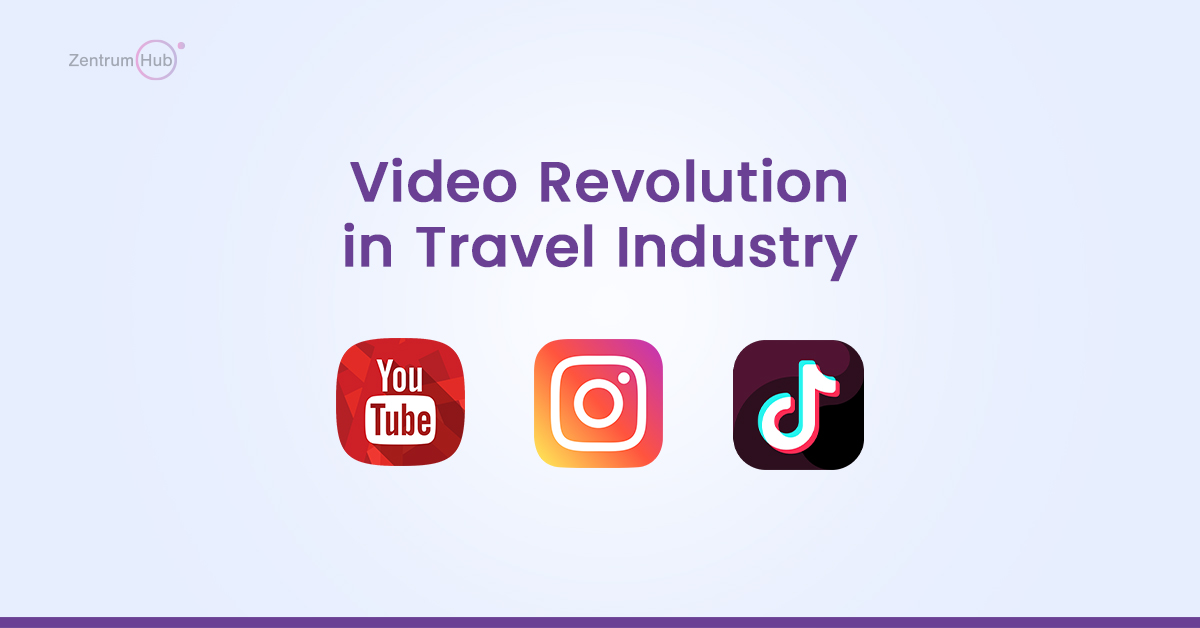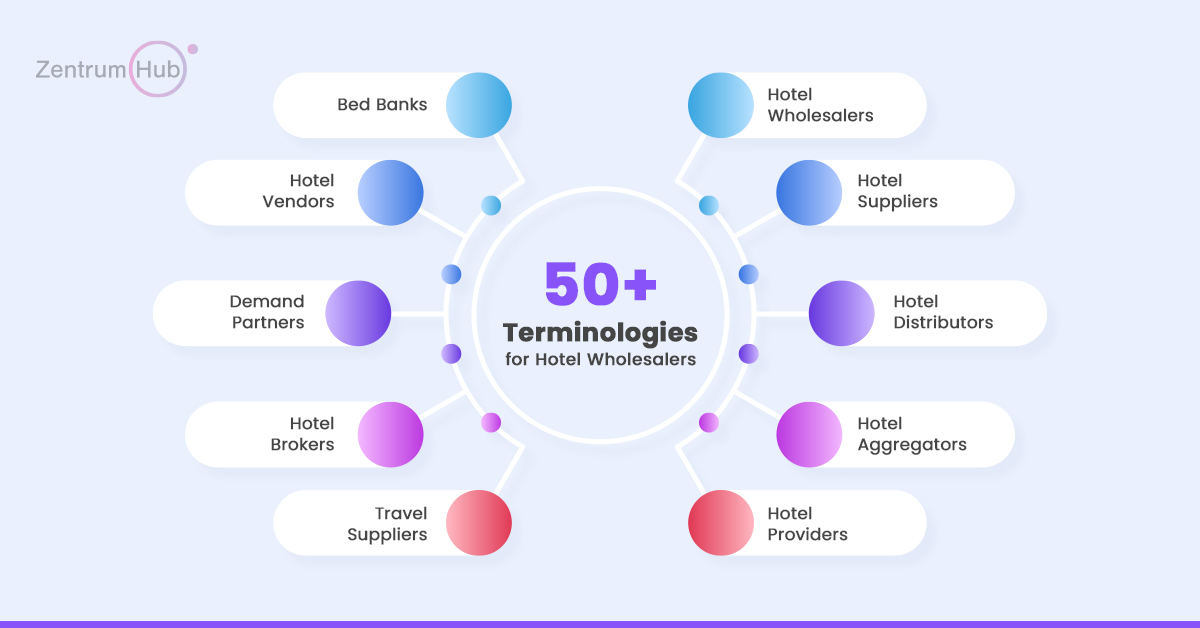- Products
Products by ZentrumHub
-
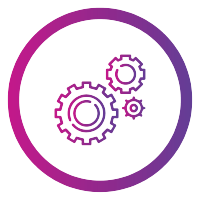 Zentrum Booking Engine
Zentrum Booking Engine
-
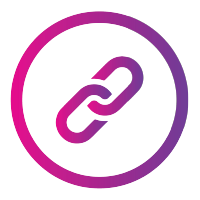 Zentrum Connect
Zentrum Connect
Zentrum Booking Engine
Fastest Hotel Booking Platform for B2B & B2C Customers
B2B – Features
- Ready to integrate 80+ hotel suppliers
- Quick agency and agent onboarding, enabling direct bookings
- Set custom markup, discounts, and commissions
- Integrated hotel, room mapping, & currency mapping
B2C – Features
- Establish your B2C brand in the travel industry
- Supplier management, search patterns, multi-currency support
- White Label solution to make personalized interface
- Multiculture & Currency standardization
- Powerful data insights to take business decisions
Zentrum Connect
Global Hotel Supplier Connectivity
- Get connected with 80+ suppliers, GDS, bedbanks and channel managers
- Multi point of sales to access public, CUG, corporate and netRates
- Pre-certified and optimized Supplier integration
- Flexible pricing options, including per-connector and usage-based models
-
- Integrated Suppliers
Get to know Pre-Integrated 75+ Hotel Suppliers with ZentrumHub
- ZentrumHub
- Insights
Insights by ZentrumHub
- Case Studies
- Press & Media
- Blog
- Events
- Webinar
- Awards
- Products
Products by ZentrumHub
-
 Zentrum Booking Engine
Zentrum Booking Engine
-
 Zentrum Connect
Zentrum Connect
Zentrum Booking Engine
Fastest Hotel Booking Platform for B2B & B2C Customers
B2B – Features
- Ready to integrate 80+ hotel suppliers
- Quick agency and agent onboarding, enabling direct bookings
- Set custom markup, discounts, and commissions
- Integrated hotel, room mapping, & currency mapping
B2C – Features
- Establish your B2C brand in the travel industry
- Supplier management, search patterns, multi-currency support
- White Label solution to make personalized interface
- Multiculture & Currency standardization
- Powerful data insights to take business decisions
Zentrum Connect
Global Hotel Supplier Connectivity
- Get connected with 80+ suppliers, GDS, bedbanks and channel managers
- Multi point of sales to access public, CUG, corporate and netRates
- Pre-certified and optimized Supplier integration
- Flexible pricing options, including per-connector and usage-based models
-
- Integrated Suppliers
Get to know Pre-Integrated 75+ Hotel Suppliers with ZentrumHub
- ZentrumHub
- Insights
Insights by ZentrumHub
- Case Studies
- Press & Media
- Blog
- Events
- Webinar
- Awards
B2B Travel Booking Portal / Software | BEST Guide for OTA
Abhinav Sinha
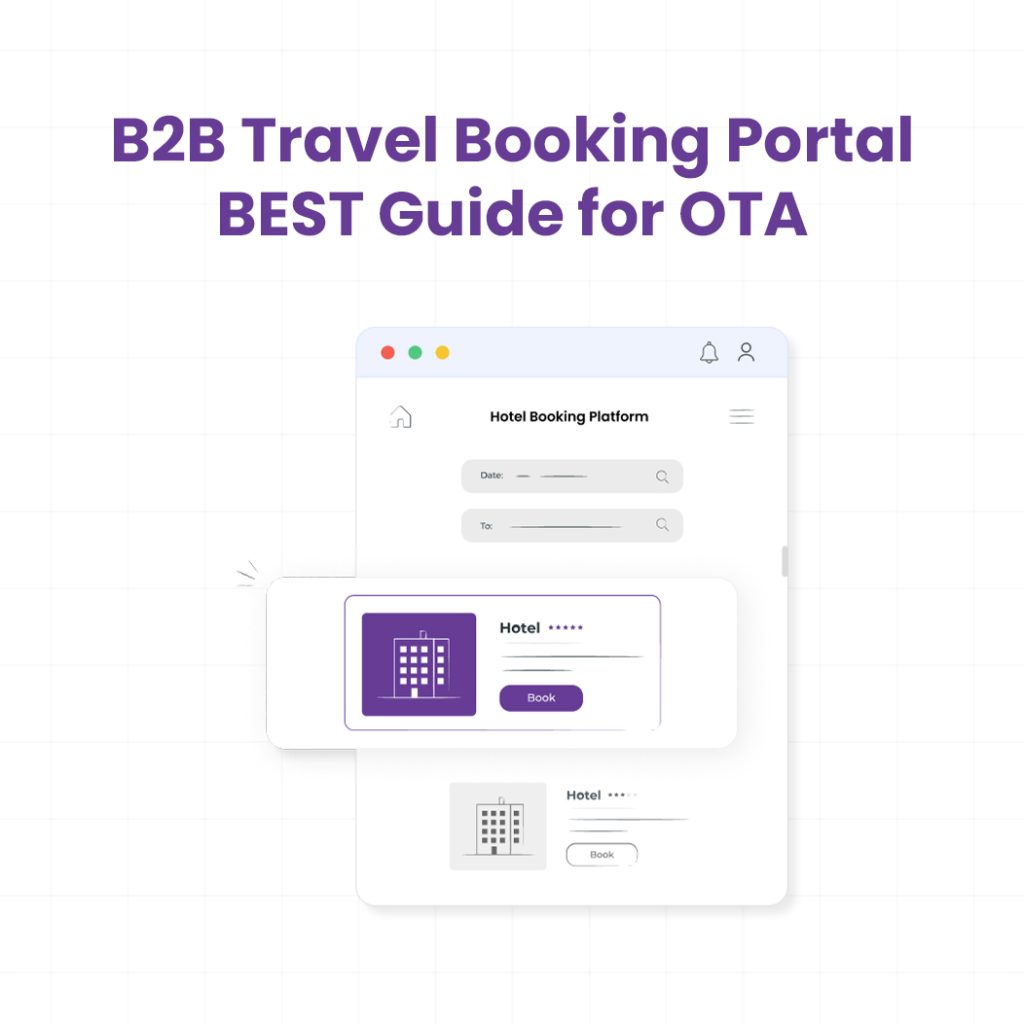
In today’s fast-paced travel industry, staying competitive requires leveraging advanced technological solutions. B2B travel booking portals have emerged as the backbone for travel agencies, tour operators, corporate travel managers, and technology providers looking to streamline operations and expand market reach. These sophisticated platforms provide a seamless connection between travel suppliers (like airlines, hotels, and car rental companies) and travel sellers (such as travel agencies, tour operators, and corporate clients), making it easier to access, compare, and book travel products.
Whether you’re a travel agency owner looking to modernize your business, a tour operator seeking efficient distribution channels, or a technology provider exploring new opportunities, understanding B2B travel booking portals and B2B travel software is essential to your success in the competitive travel industry.
What is a B2B Travel Booking Portal?
A B2B Travel Booking Portal is a specialized online platform that facilitates business transactions between travel suppliers and travel sellers. Unlike consumer-facing platforms (B2C), B2B portals are designed specifically for business-to-business transactions, connecting travel industry professionals to products such as hotels, flights, car rentals, and more.
The core function of a B2B travel portal is to serve as a centralized hub where:
- Travel suppliers (airlines, hotels, car rental companies, cruise lines) distribute their inventory.
- Travel sellers (travel agencies, tour operators, corporate travel departments) can access and book these travel products.
- Travel consolidators aggregate content from multiple sources, offering it to a network of agents.
B2B travel portals are critical for managing complex pricing structures, commission models, and business rules unique to the travel industry’s distribution ecosystem. This comprehensive approach allows both suppliers and sellers to operate efficiently and generate revenue.
Key Components of a B2B Travel Booking Portal
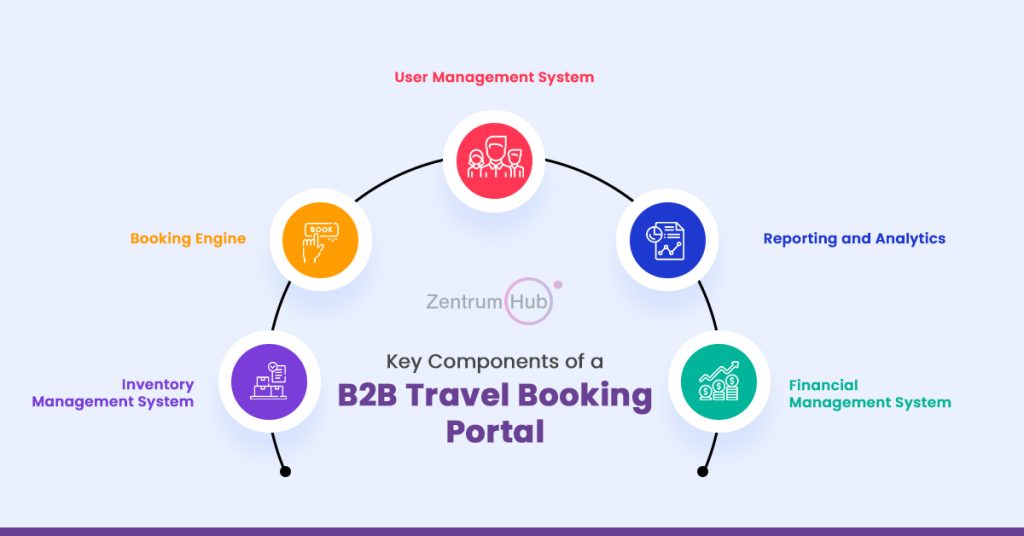
- Inventory Management System
An effective inventory management system is the foundation of any B2B travel portal. This component manages the availability, pricing, and details of travel products from various sources, ensuring that everything runs smoothly for both suppliers and sellers.
- GDS Integration: Integration with Global Distribution Systems (GDS) like Amadeus, Sabre, or Travelport ensures access to a wide range of travel content (e.g., flights, hotel rooms, car rentals).
- Direct Supplier Connections: API integrations with airlines, hotel chains, and other travel service providers allow direct access to their systems, ensuring real-time pricing and availability.
- Aggregator Connections: Partnerships with content aggregators provide access to consolidated travel products from multiple suppliers, broadening your offerings.
- Allotment Management: Tools for managing pre-purchased room blocks or flight seats ensure better control over inventory allocation.
Effective inventory management ensures that OTAs (Online Travel Agencies) can offer real-time availability and accurate pricing, a necessity for providing great customer experiences.
- Booking Engine
The booking engine processes search requests, presents results, and handles reservations. The engine is central to converting browsing into bookings and often features:
- Multi-source Search: Ability to pull data from multiple sources like GDS, direct suppliers, and aggregators simultaneously, ensuring the best options for users.
- Filtering and Sorting: The engine allows users to filter results by various criteria like price, location, amenities, and more, making it easier to find suitable options.
- Booking Workflow: A step-by-step process for selecting, confirming, and finalizing bookings, ensuring smooth transitions for customers.
- Modification and Cancellation: Tools to handle booking changes and cancellations easily.
- Special Request Handling: The engine supports additional requests such as seat preferences, meal options, and special accommodations.
These tools ensure that travel agencies can provide a comprehensive and user-friendly booking experience, whether they’re booking hotels, flights, or car rentals.
- User Management System
Since B2B portals often deal with multiple agents and clients, having a robust user management system is crucial for efficient operation:
- Role-Based Access Control (RBAC): Different permissions for administrators, managers, and booking agents, ensuring that users only have access to relevant features.
- Sub-Agent Management: This allows agencies with multiple branches or networks to manage them under one unified platform.
- White-Label Options: B2B portals like ZentrumHub provide white-label solutions that let businesses rebrand the portal with their own logos, colors, and fonts, creating a unique experience for customers.
- User Activity Tracking: Detailed insights into search and booking behaviours help businesses understand how users interact with the system and make informed decisions about improvements.
- Financial Management System
Managing financial aspects, from pricing to commissions, is critical in B2B travel portals. The financial management system within a travel booking portal provides the following features:
- Dynamic Pricing Rules: Ability to set markup or discounts for different suppliers, and manage special offers for customers.
- Commission Management: Track commissions earned from suppliers, making it easy to monitor and report on earnings.
- Credit Limit Management: Allow B2B clients with established credit to manage their limits and avoid exceeding budgets.
- Currency Management: Support for multi-currency transactions with real-time exchange rate updates.
- Invoicing and Billing: Automated generation of invoices, handling payment collection and ensuring financial accuracy.
A strong financial management system ensures smoother transactions, transparency, and accountability.
- Reporting and Analytics
For business growth, comprehensive reporting and analytics are essential for tracking performance, identifying trends, and making data-driven decisions. Key features include:
- Booking Reports: Insights into reservations, cancellations, modifications, and more.
- Financial Reports: Real-time revenue tracking, commission statements, and profitability analysis.
- Performance Metrics: Reports on conversion rates, user engagement, and booking trends.
- Supplier Performance: Evaluation of supplier performance, including reliability, pricing competitiveness, and content quality.
- Custom Report Builders: Tools for creating specialized reports that address specific business needs.
These reports help businesses improve operations, optimize sales, and track supplier performance.
Read Also B2C White Label Travel Platform – Launch Your OTA Quickly
Types of B2B Travel Booking Portals
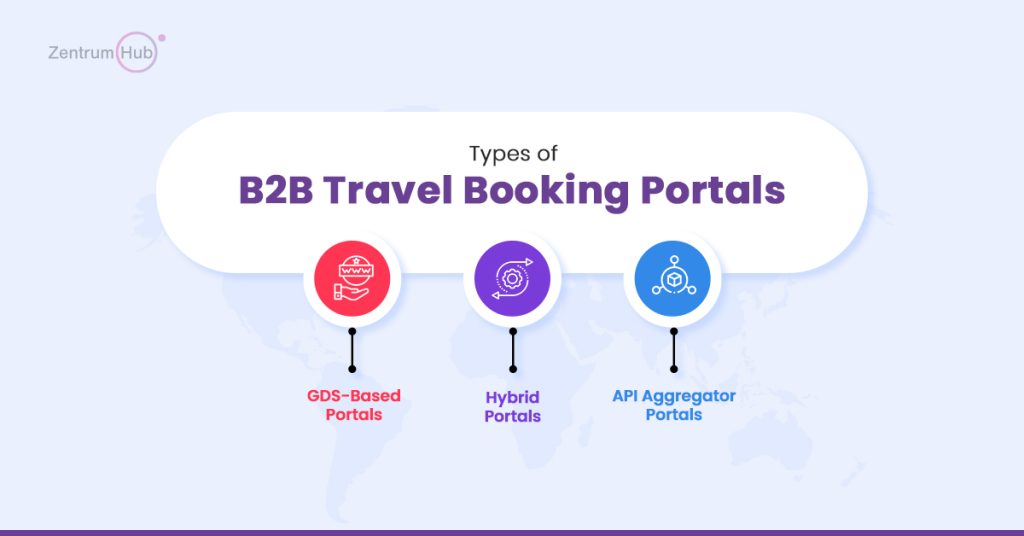
- GDS-Based Portals
These portals primarily rely on Global Distribution Systems for inventory. They offer:
Advantages:
- Broad coverage of flight content
- Established, standardized processes
- Access to negotiated fares from airlines
Limitations:
- Higher booking fees
- Limited content for certain travel segments (e.g., apartments, activities)
- Less flexibility with rich content and ancillaries
- API Aggregator Portals
These systems connect to multiple APIs from different suppliers to aggregate travel products. They offer:
Advantages:
- Direct supplier inventory without intermediary fees
- Richer content options (photos, videos, detailed descriptions)
- More flexible pricing and special offers
Limitations:
- Maintenance complexity due to multiple connections
- Reliability issues based on supplier systems
- Potential data inconsistencies
- Hybrid Portals
Hybrid portals combine both GDS-based and API aggregator approaches, offering the best of both worlds. They:
Advantages:
- Access to multiple content sources
- Fallback options for when primary sources are unavailable
- Comparison across different distribution channels
Limitations:
- Complex to implement and maintain
- Higher development costs
- Requires sophisticated reconciliation systems
Key Benefits of B2B Travel Booking Portals
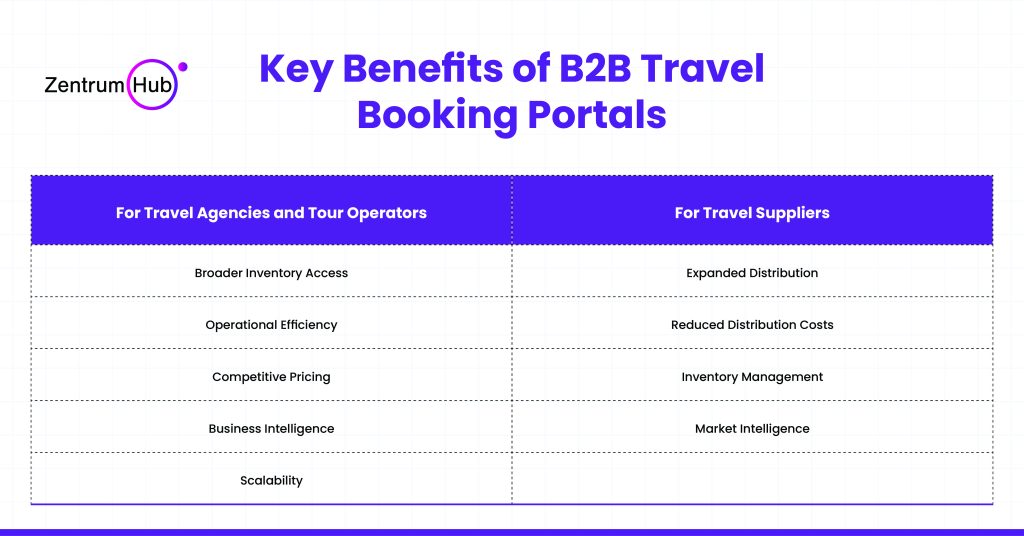
For Travel Agencies and Tour Operators
- Broader Inventory Access: Consolidate suppliers into one platform for wider inventory options.
- Operational Efficiency: Automate and streamline booking processes, reducing manual effort and errors.
- Competitive Pricing: Access net rates, and set personalized markups.
- Business Intelligence: Gain insights into booking patterns, customer preferences, and market trends.
- Scalability: Handle growing transaction volumes without adding significant staff.
For Travel Suppliers
- Expanded Distribution: Reach a broader network of travel sellers.
- Reduced Distribution Costs: Avoid traditional consumer-facing marketing costs.
- Inventory Management: Greater control over product availability and pricing.
- Market Intelligence: Access insights into sales trends, performance across different agencies, and pricing behavior.

